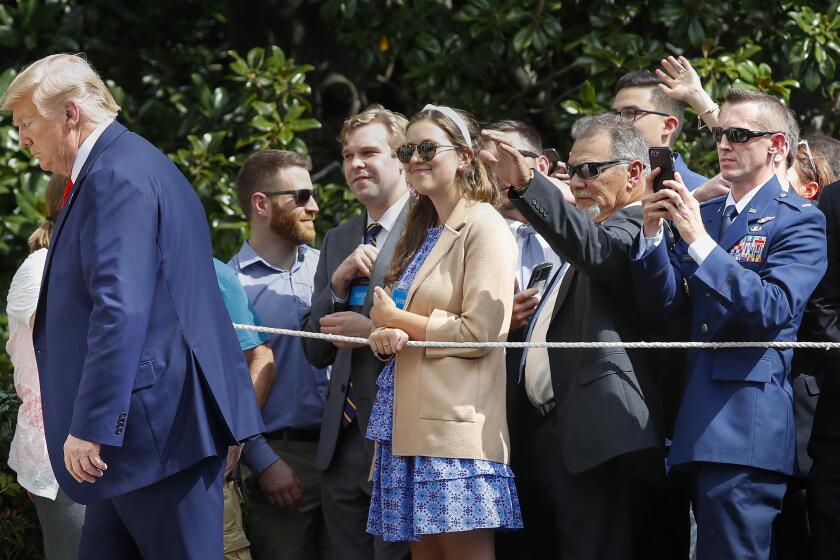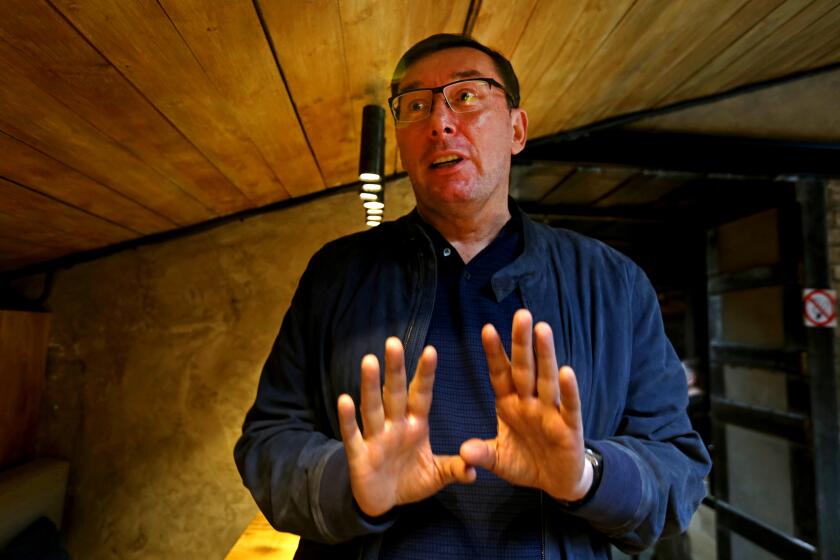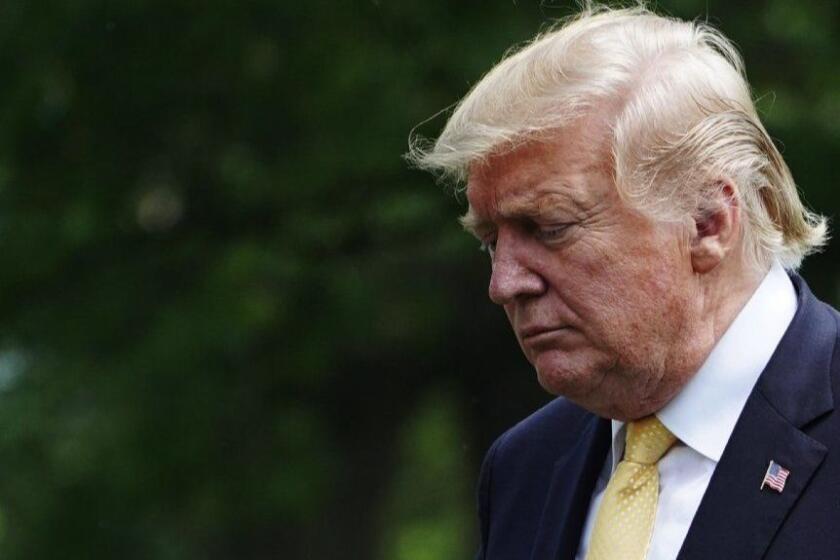Haven’t been paying attention to the impeachment inquiry? Here’s your cheat sheet for the hearing
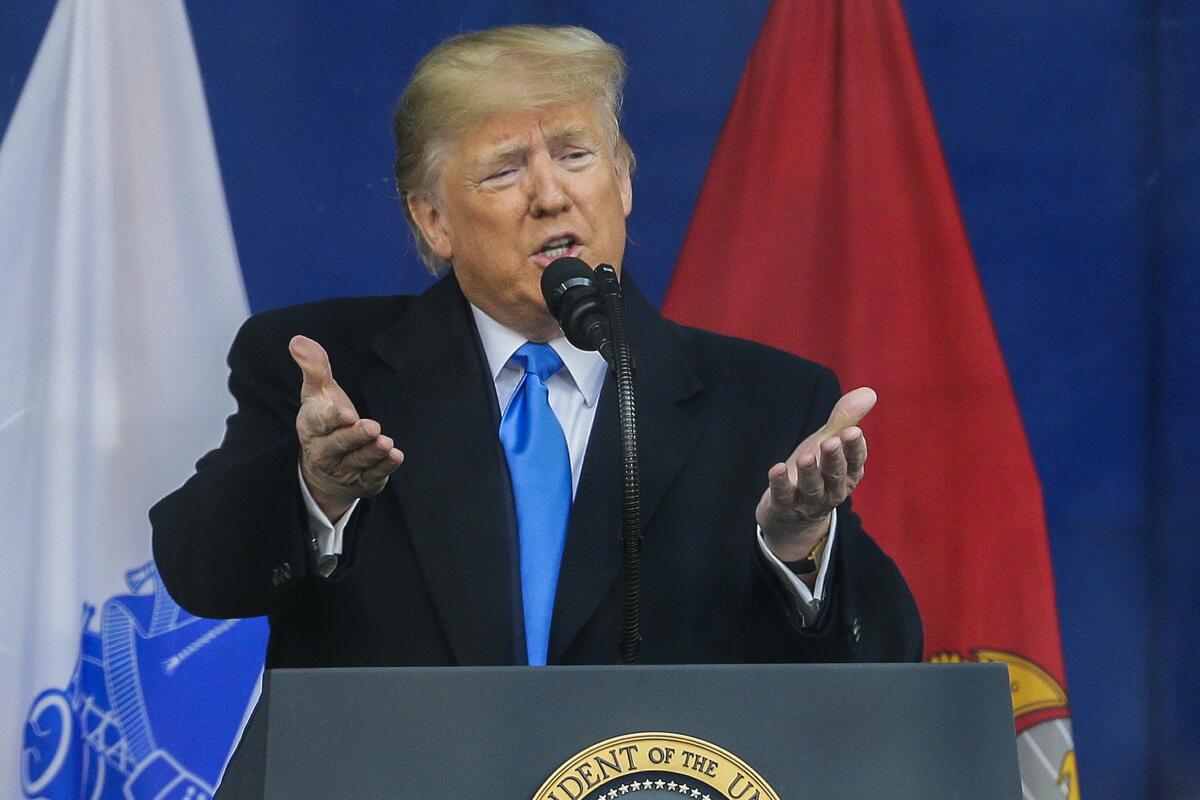
WASHINGTON — House Democrats’ formal impeachment inquiry into President Trump is moving into its public phase, with open hearings starting this week.
Haven’t been paying attention during the more than a month of closed-door depositions? Neither have a lot of people. Let’s catch up.
First off, what is the impeachment inquiry about?
In August a whistleblower filed a complaint that Trump had abused the power of his office to coerce Ukrainian President Volodymyr Zelensky to investigate former Vice President Joe Biden, Trump’s possible opponent in the 2020 presidential election, and Biden’s son Hunter, who was a board member at a Ukrainian energy company. Ukrainian officials have said neither Biden is suspected of any wrongdoing.
Congress, and the public, learned about the whistleblower complaint in September, and the House later began its impeachment inquiry.
The impeachment inquiry centers on a July 25 phone call between the two presidents, which happened while the Trump administration was holding up nearly $400 million in aid to Ukraine that had been approved by Congress.
In a White House summary of the call, Trump repeatedly asked Zelensky to investigate the Bidens and to look into CrowdStrike, a cybersecurity firm that did work for the Democrats in the 2016 election. The technology company is based in Irvine, but Trump apparently believed it operated from Ukraine. Trump has been trying to bolster a baseless theory that it was Ukraine that interfered in the 2016 election, rather than Russia, which U.S. intelligence agencies say actively worked to help elect Trump.
Trump argues that there was nothing wrong with the call because he didn’t explicitly say that providing the aid, or a White House meeting Zelensky wanted, were contingent upon Ukraine opening the investigations.
Democrats zero in on a single comment. Zelensky asks about purchasing more U.S. weapons, and Trump replies, “I would like you to do us a favor, though. ... Whatever you can do, it’s very important that you do it if that’s possible.”
The inquiry is not just about the call. Witnesses have also spoken about attempts by Trump’s personal lawyer Rudolph W. Giuliani in the months before and after the call to pressure Ukraine into investigating the 2016 U.S. election and reopening an investigation into a gas company whose board former Vice President Joe Biden’s son Hunter once served on, pressure that extended to driving out the long-serving U.S. ambassador to Ukraine.
What’s happened in the inquiry so far?
For a month and a half, members of three House committees, Foreign Affairs, Oversight and Intelligence, have heard testimony behind closed doors from more than a dozen federal employees with direct or indirect knowledge of the call, the effort to hold up the aid or the effort by Giuliani to pressure Ukrainian leaders to act.
The Trump administration has largely ordered current and former federal employees not to comply with the probe and so far have successfully kept major officials like White House acting chief of staff Mick Mulvaney, Secretary of State Mike Pompeo and former National Security advisor John Bolton from testifying or turning over documents. But more than a dozen current and former State Department and White House employees showed up anyway, with many giving day-long testimony, under subpoena, as Democrats built their case.
Now House Democratic leaders will begin presenting the evidence they’ve collected to the American public in a series of open hearings run by the Intelligence Committee. The first occur Wednesday and Friday of this week, and more are likely next week.
Who are the key players?
President Trump
Donald Trump faces an impeachment inquiry into whether he improperly delayed congressionally approved military aid to Ukraine while urging leaders there to help find dirt on his political opponents to boost his 2020 reelection bid.
Democrats say the possibility of a president working with a foreign power to influence an American election is one of the things the founding fathers most feared when debating whether to give the House the power of impeachment.
Trump has defended the July 5 call as “perfect.” He says he was only pressuring Ukraine to fight corruption and there was no improper quid pro quo.
“It’s based on a single phone call of congratulations to the president of Ukraine, which they fraudulently mischaracterized to sound absolutely horrible,” Trump said recently.
He’s criticized the inquiry as nothing more than a continuation of special counsel Robert S. Mueller III’s nearly two-year investigation into whether Trump’s campaign had improperly colluded with Russia during the 2016 election.
The final report by Mueller, released in April, concluded that Trump’s aides had welcomed Russia’s help but did not conspire with Moscow. It also found evidence that Trump may have attempted to obstruct Mueller’s investigation.
President Trump didn’t see it coming. And his aides have no plan. That’s the situation at the White House three days after Democrats launched an impeachment inquiry.
Rudolph W. Giuliani
Giuliani is Trump’s personal lawyer, although he is often entangled with national politics through the Trump administration. The former New York City mayor represented Trump during the Russia investigation and has advised him on other matters, including homelessness.
In May, Giuliani canceled a visit to Ukraine after Democrats denounced his effort to push the country to open investigations that he hoped would benefit Trump politically. Democrats said the plan signaled a clear attempt to recruit a foreign nation to influence a U.S. election. Many of the witnesses who have testified during the inquiry have painted a picture of efforts by Giuliani to push Ukrainian officials to open those investigations since early spring.
In the White House memo detailing Trump’s July 25 phone call with Zelensky, the president asked the Ukrainian president at least five times to work with Giuliani.
Giuliani has repeatedly said his only role in Ukraine was defending his client, Trump. Since the Ukraine scandal has emerged, Giuliani is facing his own legal troubles after two associates, Lev Parnas and Igor Fruman, who witnesses say helped him oust Ukrainian Ambassador Marie Yovanovitch, were arrested on charges of violating campaign finance laws in connection with their efforts to funnel foreign money from Russia into Trump’s campaign.
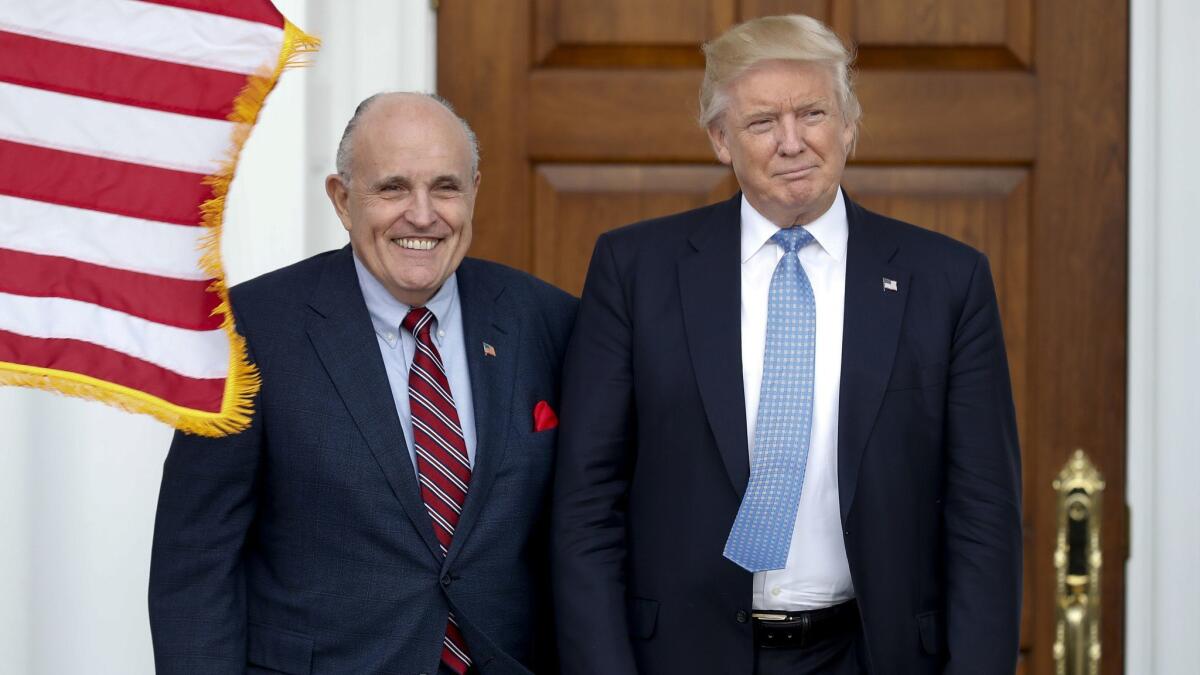
Atty. Gen. William Barr
The Senate confirmed William P. Barr as U.S. attorney general in February. Barr, who had served as attorney general from 1991-93, succeeded Jeff Sessions, who was pushed out by Trump last year.
In the White House’s account of the president’s July 25 call with Ukraine’s leader, Trump asked Zelensky at least five times to work with Barr. The whistleblower’s complaint also alleged Barr “appears to be involved” in Trump’s efforts to enlist Ukraine’s help to investigate unfounded allegations against Biden and his son Hunter.
The whistleblower complaint was referred to the Justice Department to determine whether the president had violated the law. Prosecutors decided there was insufficient evidence of a crime and took no further action. When the complaint became public, House Speaker Nancy Pelosi (D-San Francisco) accused Barr of orchestrating a “cover-up of the cover-up” of Trump’s efforts to solicit Ukraine’s help for his 2020 reelection campaign.
Ukraine and its president, Volodymyr Zelensky
President Obama’s administration began funneling millions of dollars in aid to the country after its president, Viktor Yanukovich, was ousted in a 2014 revolution for backing separatists who supported Russia’s annexation of Ukraine’s Crimean peninsula. Trump made the decision to provide lethal aid to the country after he became president, and this year Congress approved nearly $400 million for Ukraine.
Ukraine, which sits next door to Russia and has a population of about 45 million, is now led by 41-year-old political novice Zelensky. Before his landslide election victory in April, the comedian played a history teacher-turned-president on a hit Ukrainian sitcom. His campaign pledged to fight corruption and stop the bloodshed stemming from the country’s five-year conflict with Russia-backed separatists.
Zelensky told reporters in September that he didn’t feel pressured by Trump, but witnesses have told lawmakers that Zelensky desperately wanted a White House meeting with Trump to demonstrate that the U.S. government still supports Ukraine in its ongoing war with Russia and was uncomfortable with the demand that he publicly announce investigations that Trump wanted in order to get the meeting. His top advisor, Andriy Yermak, worked directly with U.S. diplomats to craft the public statement.
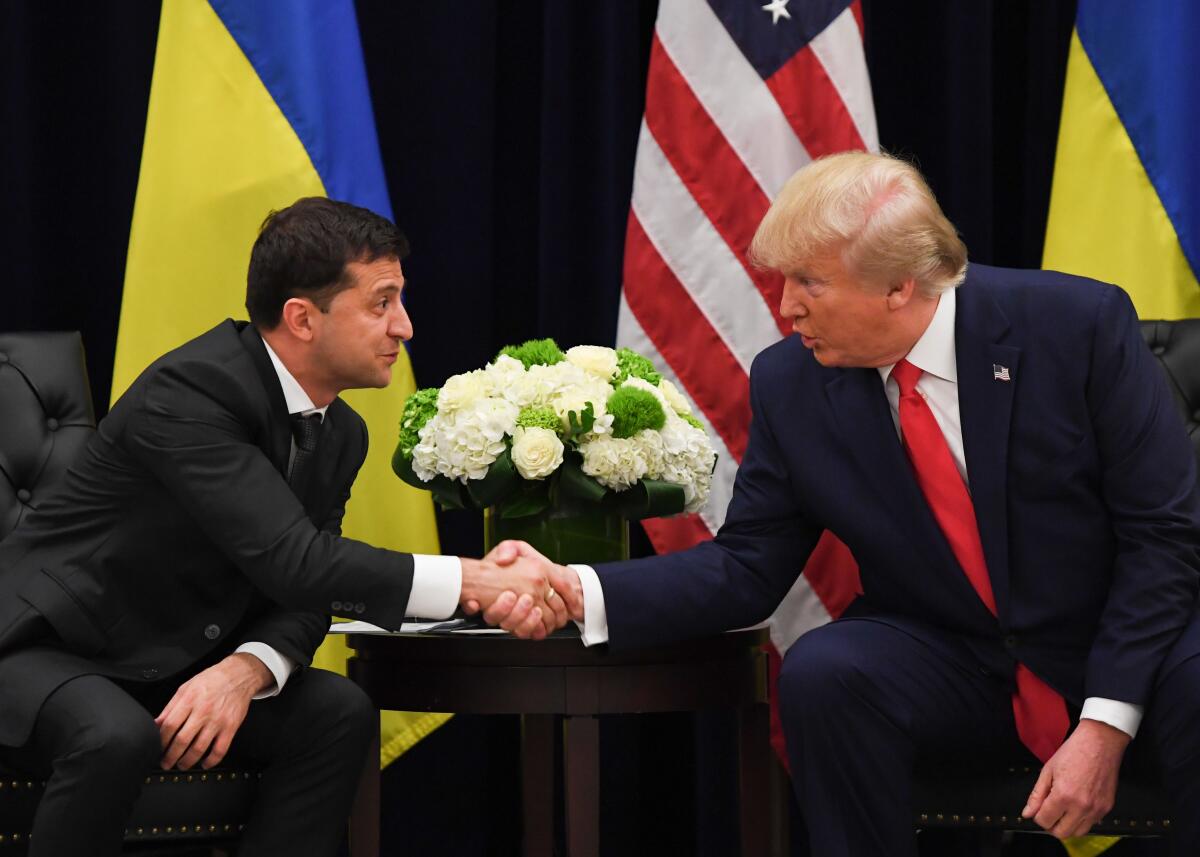
House Speaker Nancy Pelosi
San Francisco Democrat Pelosi is one of the most important leaders driving the impeachment inquiry into Trump.
Pelosi had long resisted calls to impeach Trump, but after numerous House Democrats voiced support for an impeachment inquiry following the disclosure of his actions with Ukraine, she announced the launch of a formal effort Sept. 24.
“The actions of the Trump presidency have revealed the dishonorable fact of the president’s betrayal of his oath of office, betrayal of our national security and betrayal of the integrity of our elections,” Pelosi said. “No one is above the law.”

Rep. Adam B. Schiff, Intelligence Committee chairman
Alongside Pelosi, Rep. Adam B. Schiff (D-Burbank) is the Democratic face of the impeachment inquiry. He is the head of the House Intelligence Committee, which oversees the country’s intelligence agencies, including parts of the Defense, Homeland Security, Justice, State, Treasury and Energy departments.
Trump has called for the chairman’s resignation repeatedly since the investigation began, citing Schiff’s characterization of a White House memo describing the president’s phone call with Ukraine’s leader and that he was not forthcoming that the whistleblower had contacted the committee for advice prior to filing the complaint.

Gordon Sondland, U.S. ambassador to the European Union
Sondland was appointed U.S. ambassador to the European Union after contributing $1 million to Trump’s inauguration and is one of Trump’s closest allies in the diplomatic corps. The former hotelier was identified in the whistleblower complaint along with former Ambassador Kurt Volker as part of the team that bridged the gap between the State Department and Giuliani on Ukraine.
Texts messages provided to the committee by other witnesses show Sondland working with two other diplomats to arrange meetings between Giuliani and Ukrainian officials and helping dictate what exactly Zelensky was to say in a statement committing to open investigations Trump wanted in exchange for a White House meeting.
Lawmakers questioned if Sondland had perjured himself in his initial testimony after other witnesses gave conflicting testimony. He provided supplemental testimony to the committee before the transcript was released that contradicted several key parts of his original deposition, including that he told an aide to Zelensky in early September that the nearly $400 million in aid wouldn’t likely be released unless Zelensky made the statement. That seemed to confirm other witnessess’ descriptions of a quid pro quo.
Kurt Volker, former special envoy to Ukraine
Volker, a career U.S. diplomat who started in the Reagan administration, rose to become U.S. ambassador to NATO under President George W. Bush. Trump tapped him as special envoy to Ukraine, a volunteer position. Volker stepped down as special envoy to Ukraine amid the Democrats’ impeachment inquiry.
Volker testified that he had concerns starting in the spring about Giuliani pushing Ukraine to investigate the Bidens. He also told lawmakers that Giuliani had amplified “a negative narrative” about Ukraine corruption that made Trump resistant to the possibility that Zelensky was serious about reform and prejudiced Trump about Ukraine long before his fateful July 25 phone call.
When it came to pressuring Zelensky to make a statement committing to the investigations, “it was Mr. Giuliani who said: ‘If it doesn’t say Burisma and 2016, it’s not credible,’” Volker told lawmakers. He urged Zelensky’s aides not to allow the Ukrainian president to make that statement, saying explicitly referencing Burisma would “play into our domestic politics.”
Bill Taylor, chargé d’affaires to Ukraine
William B. Taylor Jr., the top U.S. official in Ukraine, is the first witness brought for public hearings as part of the impeachment inquiry. He spoke at length about the back channel that Trump and Giuliani had created on Ukraine policy that, he said, excluded State Department experts, and how they conditioned a White House meeting between Trump and Zelensky on agreeing to the investigations.
In his closed-door testimony, Taylor was explicit on two issues central to the investigation — that Trump was demanding an investigation that could have an effect on the 2020 campaign and that the Ukrainians wanted no part of it.
“It was becoming clear to the Ukrainians that, in order to get this meeting that they wanted, they would have to commit to pursuing these investigations,” Taylor testified.
Taylor came out of retirement in June to become the top diplomat in Ukraine. Because he was appointed rather than confirmed by the Senate he is not technically an ambassador but holds the title chargé d’affaires. In text messages to other diplomats, he threatened to quit over the withheld aid.
Marie Yovanovitch, former U.S. ambassador to Ukraine
Yovanovitch is a career diplomat who served as U.S. ambassador to Ukraine from 2016 to 2019. Trump recalled her in May on the day of Zelensky’s inauguration after what she called a lengthy public and private smear campaign led by some Ukrainian officials, Giuliani and the president’s son Donald Jr. She is scheduled to testify publicly Nov. 15.
Yovanovitch outlined months of interference in U.S. policy by Giuliani to lawmakers behind closed doors, including that she was warned by Ukrainian officials early in the year to “watch her back” because of what Giuliani and his associates were saying about her. Yovanovitch testified that she was told the State Department wouldn’t issue a statement defending her against Trump Jr., Giuliani and others because it could be “undermined ... by the president,” likely in a tweet.
George Kent, deputy assistant secretary of State
Kent, a senior State Department official in charge of Ukraine policy, is also scheduled to testify Wednesday.
Kent testified in his closed-door deposition that he was told to “lay low” on Ukraine policy as the Trump administration and Giuliani, were interacting with Ukraine outside of traditional foreign policy channels. His wide-ranging testimony touched on everything from the State Department not defending Yovanovitch to the impropriety of asking a foreign government to investigate an American for political reasons.
Michael Atkinson, inspector general of the intelligence community
Michael Atkinson, the intelligence community’s inspector general, received the whistleblower complaint Aug. 12.
Atkinson, a Trump appointee, wrote in an Aug. 26 letter to Joseph Maguire, acting director of national intelligence, that the allegations involved matters that could create “serious national security and counterintelligence risks.”
Joseph Maguire, acting director of national intelligence
Joseph Maguire is the acting director of national intelligence, making him the country’s highest-ranking intelligence official.
Trump named him acting spy chief in August after Dan Coats, a former senator, abruptly resigned amid a series of policy clashes with Trump. In his role, Maguire oversees 17 U.S. spy agencies.
The first witness of the formal impeachment inquiry, Maguire was grilled over the administration’s handling of the whistleblower complaint. Maguire, a retired Navy admiral, initially refused to share the complaint or report of the independent inspector general, who deemed it credible and urgent, with congressional intelligence committees. Democrats said he was breaking the law by withholding the material.
Viktor Shokin, former Ukrainian prosecutor
Viktor Shokin was the Ukraine’s top prosecutor while Vice President Biden represented U.S. interests in Ukraine on behalf of the Obama administration.
In 2015, the U.S. and its European allies pushed to remove Shokin as part of a crackdown on corruption — a longstanding problem in the country. As part of the maneuver, Biden threatened to withhold a $1-billion loan guarantee to Ukraine if Shokin didn’t resign.
Trump has suggested that Biden should be investigated for demanding the firing of Shokin to prevent him from investigating Hunter Biden. Shokin had led the investigation into Burisma Holdings, a private Ukrainian natural gas company in which Hunter Biden served on its board.
However, the inquiry was dormant at the time Biden pushed for the prosecutor’s ousting, according to the Washington Post. No evidence indicated Biden or his son acted improperly.
In March 2016, Ukrainian officials voted to oust Shokin. The same year, a Kyiv, Ukraine, district court found no evidence of criminal wrongdoing by Burisma’s owner, according to CNBC.
Yuri Lutsenko, former Ukrainian prosecutor
Yuri Lutsenko succeeded Shokin and served as prosecutor general from May 2016 until Zelensky had him replaced earlier this year.
In a recent interview with The Times, Lutsenko said he repeatedly rebuffed demands by Trump’s personal lawyer, Giuliani, to investigate Biden and his son, insisting he had seen no evidence of wrongdoing that he could pursue.
Lutsenko said he urged Giuliani to launch a U.S. inquiry and go to court if he had any evidence but not to use Ukraine to conduct a political vendetta that could affect the U.S. election.
Lutsenko’s name has repeatedly been invoked by witnesses who say he played a major role in ousting Marie Yovanovitch as U.S. ambassador to Ukraine.
Ukraine’s former top prosecutor says he repeatedly rebuffed Rudolph Giuliani’s demands to investigate Joe Biden and son because he had no evidence of wrongdoing.
Former Vice President Joe Biden
Biden, Trump’s possible general election opponent in the 2020 presidential election, oversaw the U.S. relationship with Ukraine during Obama’s administration. This included an effort to boost Ukrainian armed forces with U.S. funds in the face of Russia’s military involvement.
While Biden represented U.S. interests in Ukraine, the Obama administration and its European allies pushed to remove the country’s top prosecutor, Shokin, as part of a crackdown on corruption. Biden had threatened to withhold a $1-billion loan guarantee to Ukraine if Shokin didn’t resign.
Shokin had led the investigation into the owner of Burisma, where Biden’s son Hunter served on the company’s board, although the inquiry was dormant at the time Biden pushed for the prosecutor’s ousting, the Washington Post reported.
No evidence indicated Biden or his son acted improperly.
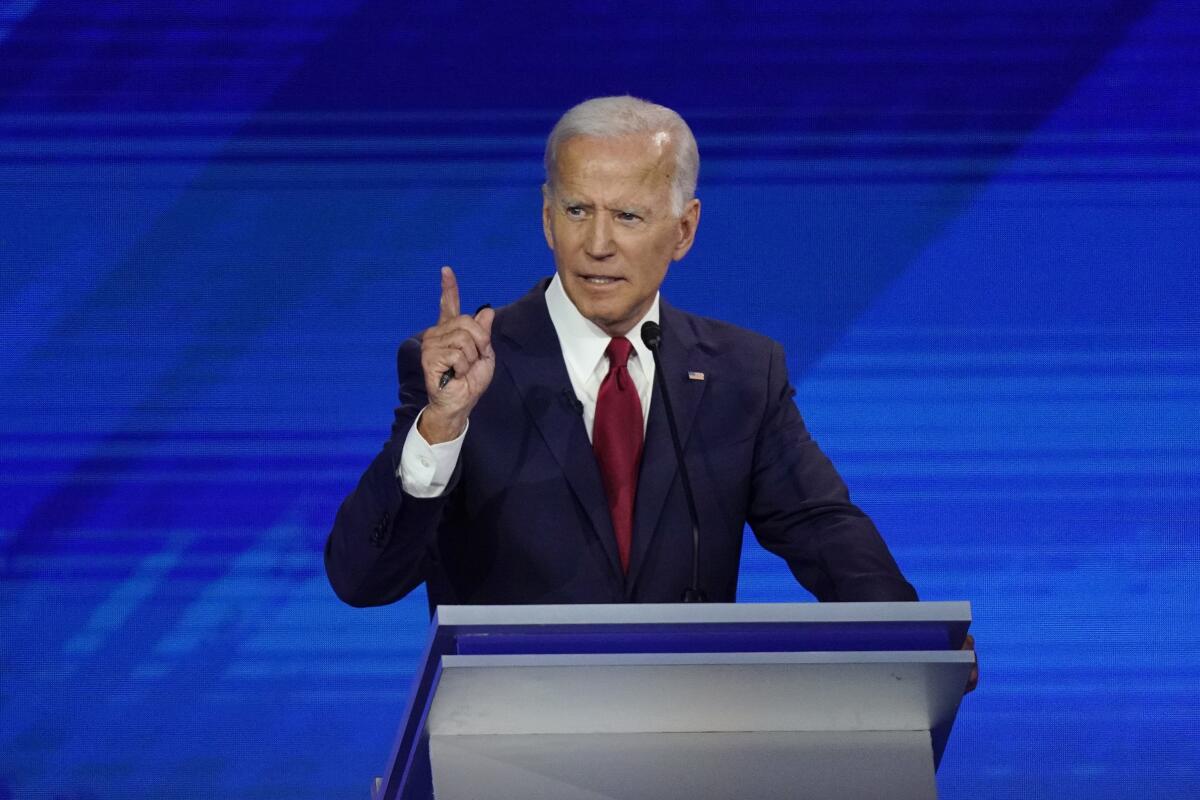
Hunter Biden
Months after Joe Biden began representing U.S. interests in Ukraine under the Obama administration, his son Hunter Biden joined the board of Burisma Holdings, a private Ukrainian natural gas company — a position that raised some concerns about a potential conflict of interest.
He was on the board while Burisma’s owner was being investigated by Ukrainian prosecutors over possible financial abuses, although Hunter Biden was not accused of any wrongdoing.
White House officials pointed to Hunter Biden’s status as a private citizen, and the vice president said his son made his own business decisions.
In 2016, a Kyiv district court found no evidence of criminal wrongdoing by Burisma’s owner, according to CNBC. Hunter Biden’s term on the Burisma board expired in April and he stepped down from the company, according to Reuters.
So, what terms do I need to know?
Impeachment inquiry
To impeach a public official is to charge him or her with or accuse him or her of misconduct in office.
To impeach someone does not remove him or her from office. Rather, it is a legal step in the process of removing an official from office.
The formal impeachment inquiry into Trump announced by Pelosi is an investigation that could lead to a vote on the articles of impeachment, which are formal written charges against the president, and whether Trump should be impeached. However, the investigation could also result in a decision not to pursue impeachment.
If a House vote on impeachment is successful, the articles would go to the Republican-controlled Senate, which would decide whether to hold a trial and whether Trump should be removed from office. Two-thirds support of the Senate is required to convict.
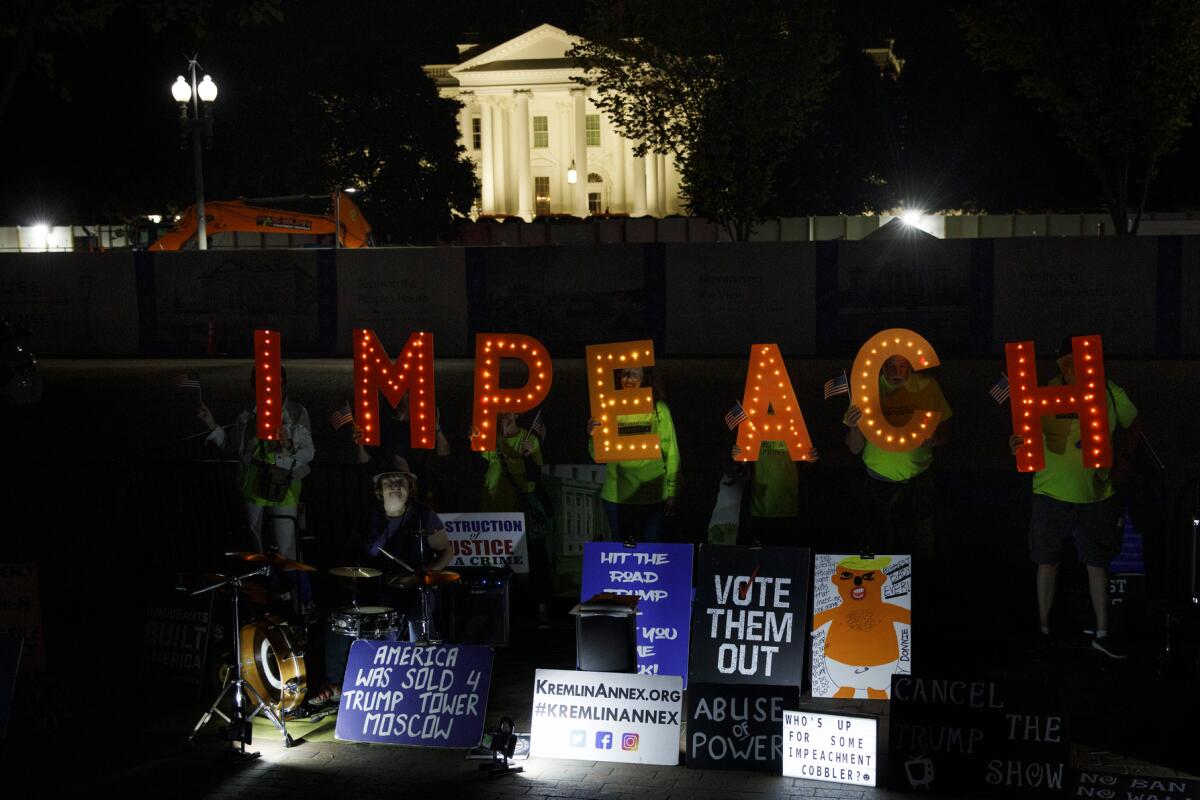
Quid pro quo
This Latin phrase means “something for something.” In a more contemporary sense, Merriam-Webster defines quid pro quo as “something given or received for something else.”
In the context of the impeachment inquiry, the term has been used to gauge whether Trump’s “favor” request of Zelensky qualifies as an implicit or explicit quid pro quo.
Concerned that people don’t understand the phrase, Democrats are instead using words like “extortion” and “bribery” to explain what they say happened.
Whistleblower
A whistleblower is an individual — often an employee — who discloses information that him or her reasonably believes is evidence of wrongdoing. Wrongdoing is considered “a violation of law, rule, or regulation; gross mismanagement; a gross waste of funds; an abuse of authority; or a substantial and specific danger to public health or safety,” according to the Office of the Director of National Intelligence.
Once a federal employee discloses wrongdoing through proper channels to someone who can correct the wrongdoing (such as a government supervisor or supervising office), him or her is granted whistleblower protections. These protections are meant to shield whistleblowers from retaliation that could affect their job duties, responsibilities, working conditions and their “eligibility” for access to classified information.
Speaker Nancy Pelosi will announce that the House will pursue an impeachment inquiry of President Trump. What does an impeachment inquiry entail?
The White House phone call memo
A declassified memo released by the White House describes Trump’s July 25 phone call with Zelensky — a conversation at the center of House Democrats’ formal impeachment inquiry into the president.
It is important to note the five pages released by the White House are not a word-for-word transcript of the 30-minute conversation.
In the document, White House officials noted that memorandum “records the notes and recollections of Situation Room Duty Officers and NSC policy staff assigned to listen and memorialize the conversation in written form as the conversation takes place.” That means the account was prepared using voice recognition software, along with note takers and experts listening in, according to senior White House officials.
CrowdStrike
CrowdStrike is a cybersecurity firm that did work for the Democrats in the 2016 election and was the focus of conspiracy theories.
The White House memo describing Trump’s call with Ukraine’s leader showed that in addition to his interest in the Bidens, Trump prodded for evidence that could tarnish the special counsel investigation.
“I would like you to find out what happened with this whole situation with Ukraine — they say CrowdStrike.”
The technology company is based in Irvine, but Trump apparently believed it operated from Ukraine. The question came after Trump had long questioned the origins of the Russia investigation, particularly the analysis that CrowdStrike made to determine that operatives backed by Moscow hacked Democratic National Committee computer networks.
What are we missing? Tell us in the comments section below.
More to Read
Get the L.A. Times Politics newsletter
Deeply reported insights into legislation, politics and policy from Sacramento, Washington and beyond. In your inbox three times per week.
You may occasionally receive promotional content from the Los Angeles Times.
